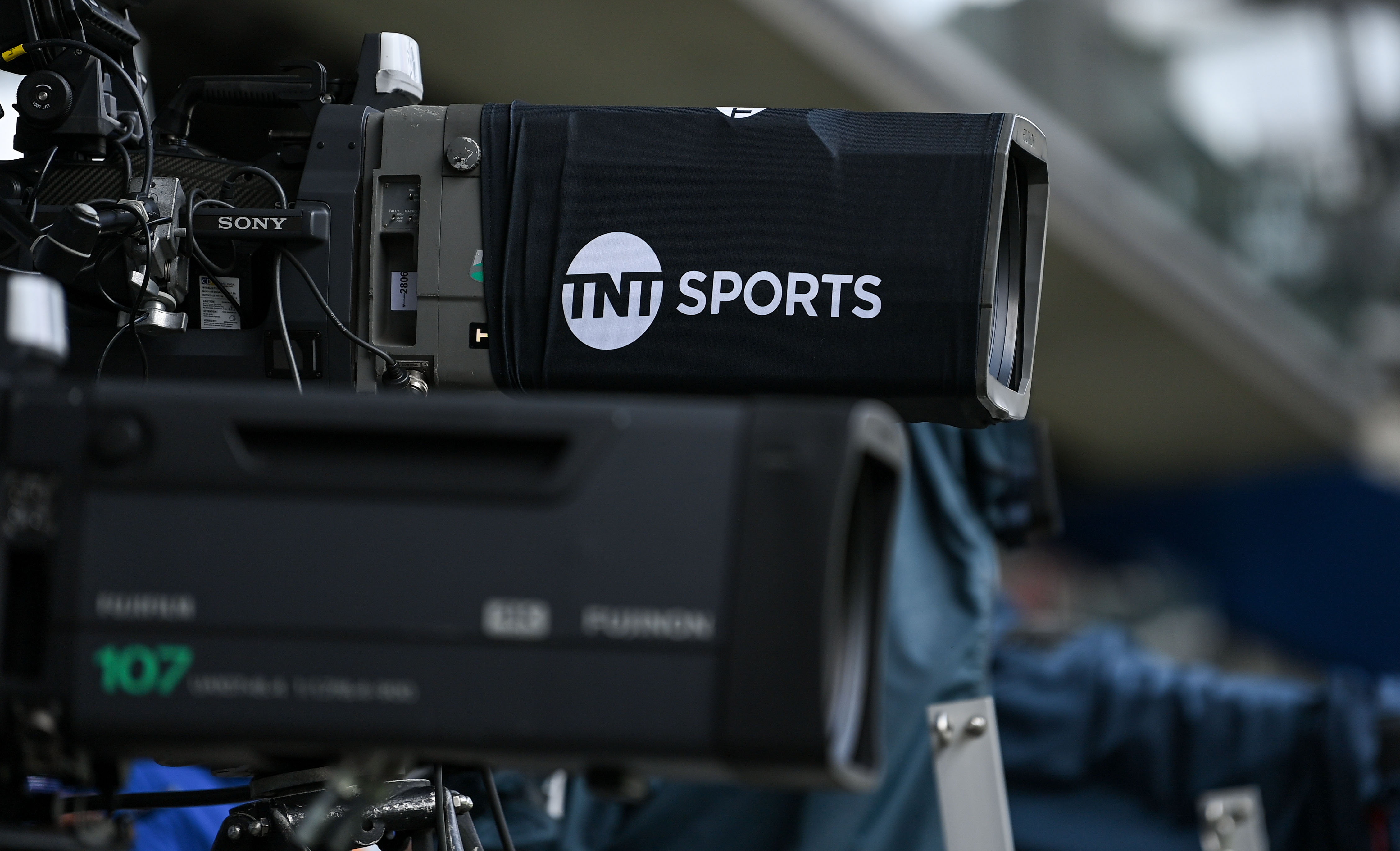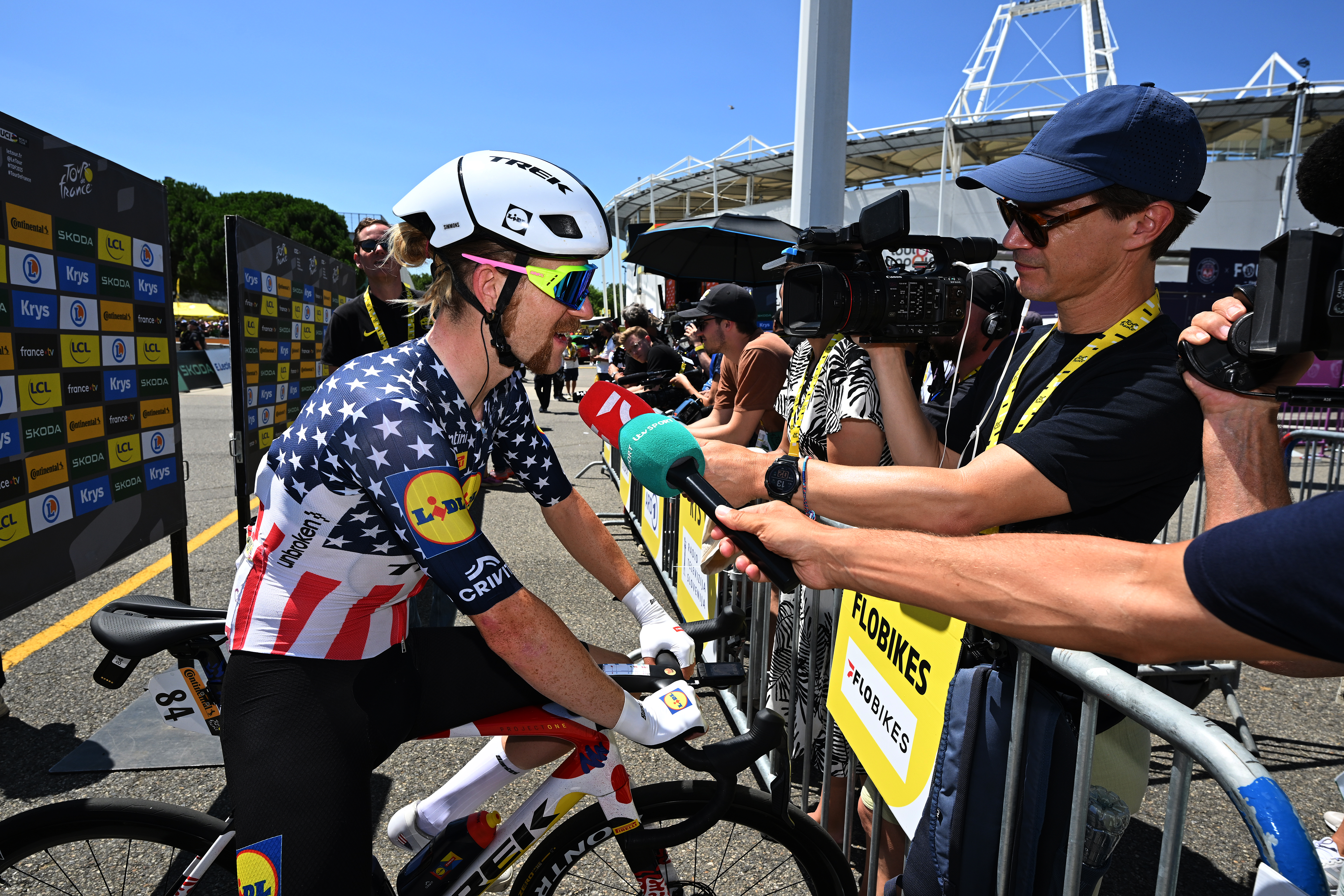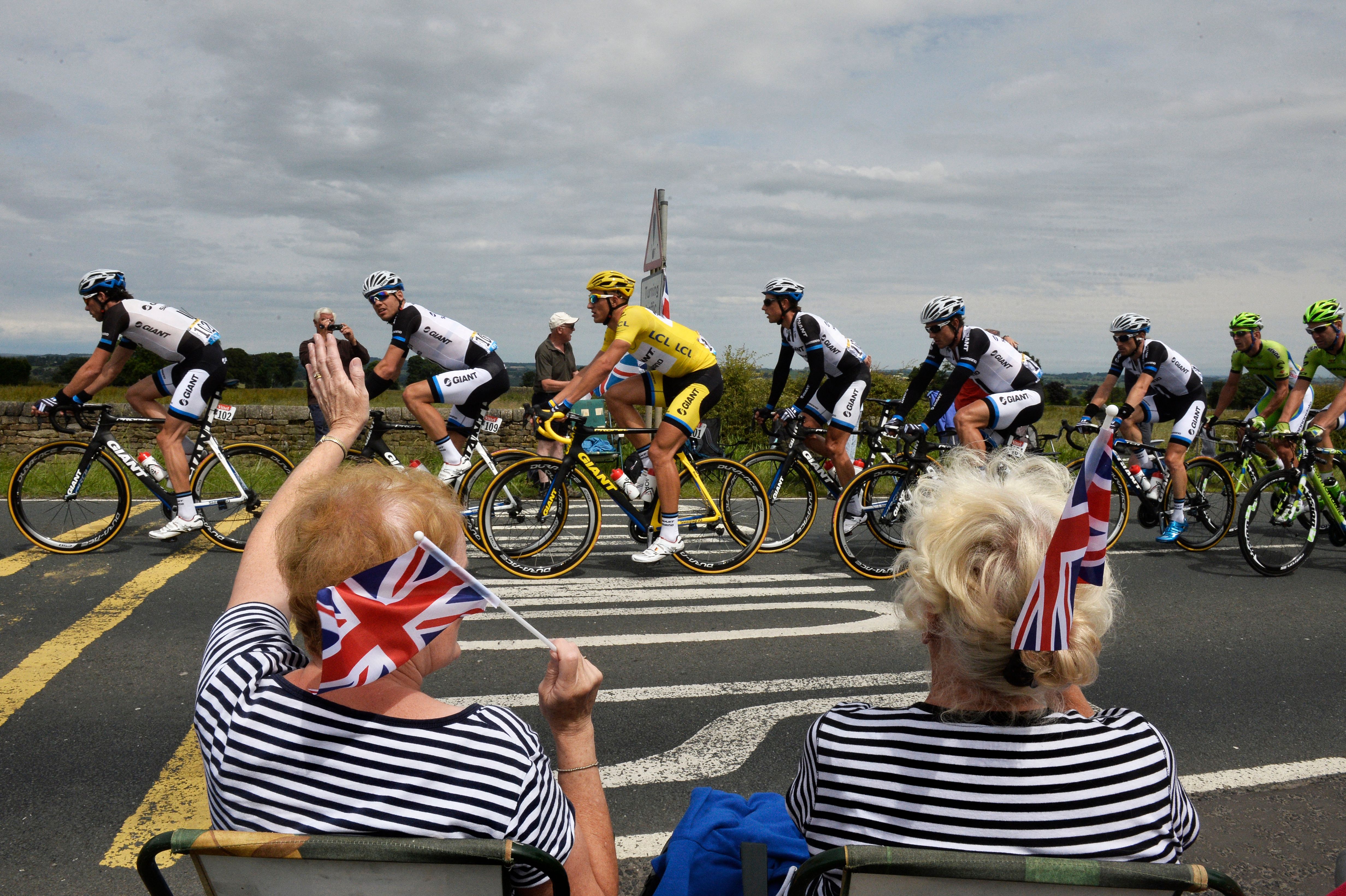
UK broadcasting rights in cycling have changed dramatically in recent years, since the closure of GCN+ in December 2023 and Eurosport earlier this year, as well as the end of 40 years of free-to-air Tour de France coverage on ITV.
The landscape now looks very different as Warner Bros. Discovery (WBD) owns the exclusive rights to cycling coverage in the UK under TNT Sports, nestled within its platform discovery+.
It costs £30.99 per month, a sting compared to the previous £6.99 a month GCN+ subscription, or Eurosport at £39.99 per year.
This has caused furore amongst fans, with discontent rife not just with the price hike, but also coverage quality and race options for the cost. This is leading some fans to choose between paying up, turning off, or finding illegal pirate streams.
However, while the rights changes are negatively impacting core cycling fans, the broader effect could be paramount for cycling’s future. The wider WBD network, and those like it in other nations, could open opportunities, capture new fans and lead to a greater audience overall.
The appeal of piracy
UK searches for the illegal pirate platform Tiz Cycling are at a five-year high, and grievances over the cost of a TNT Sports subscription and the actual cycling coverage on offer appear to be the drivers for this. TNT Sports is just one example, as in other regions around the world, high-cost subscriptions such as Flobikes in Canada and Peacock in the US, have become some of the only options to watching top-tier cycling.
Tiz Cycling is the most popular illegal streaming platform, and while not possible to attain exact growth figures from the platform, as Tiz did not respond to Cyclingnews for comment, we can assume this growth from the rise in Google searches.
Reasons for this primarily appear to hinge on the price increases that have hit various subscribers around the world, but peaking at a 343% increase for discovery+ subscribers after cycling moved into the TNT Sports package.
Previously BT Sport, TNT Sports broadcast a range of sports, with Champions League and Premier League football being the prime assets, which explains the price tag.

"I cancelled because TNT is pricing out a significant portion of cycling fans by charging people £31 per month, and I refuse to support that," said cycling YouTuber Benji Naesen, who recently ended his subscription.
"Reality is, TNT paid a lot of money for football licenses and is trying to offset that cost by charging everyone this pricing. In doing so, they’re going to lose their one-sport-only customers like myself."
"continue to enjoy your ad-free on-demand viewing experience"There was nothing ad-free about my viewing experience. 😂 pic.twitter.com/zAkLbTFnnKAugust 1, 2025
Moreover, fans used to be able to watch ad-free coverage of most races via the discovery+ digital platform – the linear TV coverage always had ads – but ad breaks were added to all streams during the Tour de France this year, which led to further discontent for fans paying a lot for what previously was an ad-free service.
"Appreciate there’s no right to follow it uninterrupted, and it sounds entitled, but when that option has been removed, especially with the cost having risen, it’s a poor showing," wrote one user on a Reddit forum.
One X user wrote, "I want to complain to TNT about the adverts on the TdF men's & women's coverage when I paid for ad free. They are getting my revenue and that of the advertisers. It's not right when I paid in good faith for advert free."
On the TNT Sports subscription sign-up page, it says some live sports streams may include ads.
Though TNT and discovery+ show a wide range of races, it's still not every televised race – leading many to feel like they're missing out despite the premium packaging.

Several cycling fans said they watch races on Tiz, which are not broadcast on services which they pay for; these are often women’s cycling races and non-European races, as there are a small number of races that are produced for broadcast, but for which TNT does not own the rights.
Others are simply turning cycling off. One X user said, "Been watching the Tour [de France] since the mid-1980s, currently watching the highlights on ITV, when it goes behind a paywall I'll stop watching."
Though it's hard to pinpoint exact numbers for road cycling, the mountain bike site Pinkbike recently polled their users, and the results were stark. Mountain bike World Cups used to be free to watch on Red Bull TV before it moved to WBD – who own and broadcast the Mountain Bike World Series – meaning the sport went through arguably the biggest price increase of them all, from zero to over £30 a month.
Pinkbike's poll is still open, but when 6,000 people had responded, the results showed that 3,500 people said they used to watch full races on Red Bull, but only 800 said the same of the current coverage – 3,000 people answered "not at all" when asked if they watch the WBD coverage. "Access/paywall issues" was by far the most selected reason for not watching, so it's clear the viewers are turning off, and in significant numbers.

However, for some, it’s the price to pay to watch their favourite sport, and many have just absorbed the price increase. "I’m not happy to pay the extra but it’s my favourite sport and I pay up," another X user commented.
The rise in piracy is also not limited to cycling. The latest report by UK anti-piracy firm MUSO and Kearney revealed that global piracy levels have risen by 12% since 2019, with live sports and anime seeing the fastest growth rate.
Risks of piracy
While pirate streams are free to watch, they are illegal and involve taking considerable risks.
Accessing pirate streams can lead users to be more vulnerable to data theft, identity theft, malware and fraud. The Copyright, Designs and Patents Act 1988 also protects broadcasters and rights owners from other people using their content.
"Sports fans need to know that, if they use a piracy app, they’re jeopardizing their security and privacy through malware, phishing, and data theft," said Larissa Knapp, Executive Vice President and Chief Content Protection Officer for the Motion Picture Association.
"Piracy sites – including illegal streaming platforms, peer-to-peer networks, IPTV services, scam portals, anime piracy sites, and manga repositories – carry a cyber risk more than 22 times higher than mainstream websites.
"Using pirated websites to watch cycling undercuts the future of cycling as it’s no longer an investment in the future of the sport; it’s funnelling money to criminal piracy rings."
Several fans acknowledged these risks, and many said they use a VPN when watching Tiz. Another said, "Generally prefer not to use illegal streaming sites, but also definitely prefer to watch than not."
Illegal streaming and copyright infringement is both a civil and criminal offense, meaning rights holders can make civil claims against perpetrators, but the police can pursue criminal prosecution, too. Two men were jailed this year in the UK for running illegal streaming websites and associated money laundering.
Does free = more accessible?
Illegal streaming services do not offer perfect viewing, with reports of low quality, drops in coverage and the aforementioned risks, but they do offer access to the sport for those who could otherwise not afford big-cost subscription services.
Though watching most cycling in the UK has never been free, TNT Sports' £30.99 monthly subscription is not affordable for everyone and prices some people out. This makes the sport less accessible than when it is free-to-air, for example, and arguably less likely to capture new fans.

"The biggest race in the sport is not going to be as accessible, and it’s the one that funnels a lot of fans into the sport," said Dan Lloyd, ex-pro cyclist and GCN presenter, referring to the loss of free-to-air Tour de France coverage in the UK.
"Undoubtedly, the viewership will be lower than it was this year and years gone past in the UK."
While ASO does not set the subscription prices, it did agree to an exclusive sale of Tour de France rights to TNT Sports. Naesen noted that, "ASO are hurting themselves in the long-term because a sport that’s less accessible to follow is a sport that will end up with less fans in the future."
In an email exchange with BikeBiz several years ago, Tiz, the founder of Tiz Cycling, wrote, "I’m trying to spread cycling as much as I can and make it accessible worldwide for anyone."
Disparity per country
What’s also noticeable is that subscription prices for watching cycling vary per country. TNT Sports is the UK option, while in other countries, cycling is under discovery+, also owned by WBD.
In Germany, on the other hand, it costs just €4.99 a month, in Italy €7.99, while in the Netherlands, HBO Max and the necessary sports add-on to watch cycling cost €14.99 per month.
This is where VPNs come in, which disguise a user’s location and theoretically allow fans to purchase a cheaper subscription from a different country.
Several fans said they use a VPN to watch coverage through services in other countries that have reasonable pricing. While general use of a VPN is legal in the UK, this practice is often against the terms and conditions of broadcasters, and doing so to dishonestly avoid paying a subscription fee could also be a criminal offence.
Others watch Tiz Cycling when travelling and when they cannot access races in other countries due to broadcasting restrictions, with the subscription they have already paid for.
What’s more, many European countries offer free cycling coverage through public broadcasters, and Eurosport 1 and 2 still exist in 50 countries, although these don’t include coverage of every race.
Notably, while the UK ceased free coverage this summer, the Tour is free to watch in 14 countries, including France and Belgium, while Australia's public broadcaster SBS offers many races for free, including the Grand Tours.
Across the Atlantic, Canadian fans can watch cycling on FloBikes for $29.99 per month, with a saving if you pay annually, while in the US, Peacock costs $16.99 per month for ad-free, and HBO Max (also owned by WBD) is $20.99 for premium, which includes cycling.
Prices for HBO Max, much like TNT, vary per country, and don't show every race – you would need a subscription to both Peacock and HBO Max to watch everything, which could also be leading fans to look for free-to-view and illegal platforms instead.

Distilling the impact
Given the rise in searches for pirate platforms and the constant money issues in cycling's economic model, there is a question of whether the sport itself is directly impacted by decisions not to pay to watch.
"Its effect on the teams is zero because they don't get any of the money from the rights that the likes of TNT pay to ASO and other race organisers to be able to show the races on their platform," said Lloyd.
"The only effect is on TNT because they're trying to get people to part with money for a subscription to multiple sports, including cycling. They've been aware of Tiz Cycling for many years. It's something we were aware of when we had GCN+ and we were owned by Warner Bros Discovery, and one that they did try to shut down, but obviously unsuccessfully."
A Warner Bros. Discovery spokesperson said: "Unauthorised platforms undermine and threaten the revenues that support broadcasters’ investment in sport and events, including cycling — revenues that are shared throughout cycling and help to sustain the sport’s future."
However, despite this claim of revenue share and to Lloyd’s point, the benefit to cycling teams is indirect, as they do not get a revenue share of the broadcasting, unlike in other sports such as the Premier League.
Broadcast revenue of Premier League clubs in 2023/24 was £3.3 billion, of which the teams are guaranteed an equal 50% split, shared among them, and the rest is split dependent on TV appearances and position in the league table. This has seen teams flourish and be able to spend huge amounts on new players.
Should revenue share be introduced?
Despite many people's concerns, cycling data expert Cillian Kelly crunched the numbers for the 2024 season and concluded that men’s pro cycling is more stable than ever.
He revealed that only one team at this year’s Tour will have existed for less than 10 years, while the rest have surpassed 15 years, with some having existed for more than 40 years.
"The average lifespan of a current Tour de France team has never been longer in the history of the sport, so it is still working, but I think a lot of teams and managers think it could be better," said Lloyd.
"It's been a big subject for quite a long time that if you divided some of the rights money amongst the teams, then it might help them have a bit more stability and therefore fans will have teams that they can support for decades as opposed to less time than that.
"I think that there would be a different outlook from many fans if they knew that the money was, in part, going towards the teams and sustaining them."
How cycling compares to other sports
Requiring a subscription to watch sports is becoming more common as streaming giants are entering the sports industry. While there is discontent about cycling’s situation, some sports have succeeded behind paywalls.
"If you look at the big boxing matches or even UFC, people are prepared to pay a lot of money for one single fight, and they're prepared to pay quite a lot of money to watch football month in, month out," said Lloyd.
"The problem cycling's got is it's not at that level in the UK, and also because it's been free for so long, people are much more reluctant to pay for it."
However, UFC just ended pay-per-view after signing a seven-year deal with Paramount in the US.
Women’s football is an example of a sport which has grown exponentially in recent years, with a 56% increase in participation in four years. While some matches are behind paywalls, the biggest ones currently aren’t – though the premier competition in the UK, the Women's Super League, has secured its biggest-ever commercial TV deal to put many more games on Sky, which is a paid channel.

"Women’s football just saw a newly signed deal for the Women's World Cup in 2027, which will be free-to-air on the BBC and ITV," said Charlie Edwards, sports lawyer at media and entertainment law firm Simkins LLP.
"Women’s football is a great example of a rapidly growing sport, and implementing untimely paywalls could negatively impact that growth."
In the UK, certain sporting events are protected under the Media Act 2024 as being in the national interest and thus must be available on "fair and reasonable terms" to the free-to-air channels.
These events include the Olympics, men’s and women’s FIFA World Cup and Euros finals, Wimbledon finals, FA Cup Final, and the Grand National.
Cycling is not included despite a motion in the UK Parliament which argued for free-to-air coverage.

Changing viewer habits
Capturing the attention of new cycling fans is not just a challenge for monthly subscription numbers; viewership habits are changing.
Amidst the streaming and social media giants, traditional broadcast channels continue to see a downturn as young generations prefer to choose what to watch whenever they want to watch it.
In Ofcom’s most recent annual report on UK media habits, broadcast TV viewing was down 4% in 2024 compared to 2023. YouTube is becoming more popular, with the platform increasingly showcasing long-form content and mirroring that of a standard broadcasting platform with adverts.
According to research, two-thirds of global sports executives are concerned about the relevance of live sports as more young fans gravitate towards highlights, documentaries, and short-form video.
What the backlash around the TNT subscription cost has shown us is that some fans are moving to other media forms to follow cycling, like podcasts, and, as our attention spans dwindle, short-form video is becoming more popular too.
An X user wrote: "Not watching it this year, for the first time in a long time. Following it through Lanterne Rouge podcast and highlights. I'm happy I can get the overall picture, but it's a shame and I'm not watching the big stages/climbs and seeing the big moments as they unfold."
"We could see broadcasters developing their services so it's more interactive, more personalised and more akin to the streaming platform," said Edwards.
"There’s also the potential for a cross-pollination of industries, as we’ve seen in LIV Golf, where music licences have allowed them to play music on the course and interact and engage fans in different ways."
The ever-increasing value of sports rights
On a wider level, sports broadcasting rights are constantly changing, and so too are the streaming giants’ offerings. WBD recently revealed they’re looking to launch Max in the UK in 2026, which would add another option to an already fragmented landscape of subscriptions.
This is compounded by the news that Warner Bros. and Discovery will split into two separate, publicly traded companies by mid-2026.
What isn’t changing is the value of sports broadcasting rights.
"TV rights in sport are becoming more and more lucrative," said Edwards.
"The sports industry is growing in value exponentially, which is why we're now seeing a shift with tech giants wanting to make their way into this landscape. For instance, the likes of Amazon and Netflix streaming live events such as wrestling and the NFL.
"Rights holders within sport will need to tread cautiously when diversifying who they're selling their rights to. Ultimately, the consumers (i.e. fans) could be the ones who pay the price for a new, fragmented service as they will have to maintain various subscriptions to keep watching their team."
The future of cycling under Warner Bros Discovery and TNT
As cycling settles under its new owner, amidst a cloud of illegal streaming and furore, there is a greater impact that being a part of WBD affords cycling.
The broadcaster has made financial decisions which have positively impacted the growth of women’s cycling.
WBD showed the Tour de France Femmes from the outset in 2022, first on Eurosport and now on TNT Sports, whilst free-to-air men's Tour broadcaster ITV opted not to buy the rights to the race, and has never shown it.
"The opportunity that's in front of us now is greater than we've ever seen before as Warner Bros. has a broader account base of 1.5 billion people around the world," said Josh Carlson, TNT Sports commentator and ex-pro mountain bike racer, meaning that there is the potential for new audiences to cycling from this platform.
"Obviously not that many people are going to see people on bikes but if there's 110 million TNT Sports accounts or Max accounts around the world and that sport is on those channels, maybe 3 million accounts might click on and watch it and 1 million might stay and all of a sudden that's a dramatically different amount of people watching and that's just on television.
"That's not including all the social media, all the YouTube, all the work that the social team is doing, there's now so much content to draw those viewers in."
This opportunity presents a difficult scenario where some of the core cycling audience are being left behind.
"The tough reality is if the core doesn't want to pay, they'll figure it out because they're our core audience and they'll want to watch it," added Carlson.
"They'll watch the YouTube channels, they'll find an illegal stream, they'll do what they need to do. There are still 110 million TNT Sports accounts out there that already have this channel and are already paying.
"Warner Bros. has a platform to showcase cycling to so many more people than we ever could imagine. There’s the opportunity to turn our athletes into superstars and household names, get families, get people, get kids, get everybody on bikes, and then we're moving in the right direction."

Moving forward
Sports broadcasting rights are constantly changing and remain incredibly important for funnelling both money and fans into a sport. For cycling, with higher subscription costs under TNT Sports, and the like, and without a revenue share scheme, this impact may not immediately be evident.
The £30.99 TNT Sports subscription service means that watching cycling has become more expensive than ever in the UK, impacting some core cycling fans by pricing them out, and as such, some are choosing illegal pirate platforms, despite the risks involved.
How we consume cycling races is also evolving, with YouTube and short-form content thriving, which opens up new possibilities for cycling content which captures new generations of fans.
There’s also an opportunity for cycling to be part of such a huge broadcaster as WBD, and it will be instructive to see how this plays out in the next few years.
Ultimately, we want more people watching cycling, more people on bikes, and we want growth for years to come. If a higher-priced services can guarantee this, many will pay up.
Emma Cole is a gold-standard NCTJ journalist who loves anything to do with adventure, sport and sustainability. Alongside writing about these passions for Cyclingnews, her work has also featured in Cycling Weekly, Outdoors Magic and Cyclist Magazine - where she previously held the role of Features Writer for over two years. Emma hosts her own podcast, The Passion Stories Podcast and has a first-class degree in French and Politics.
You must confirm your public display name before commenting
Please logout and then login again, you will then be prompted to enter your display name.
